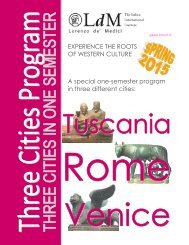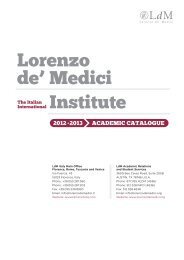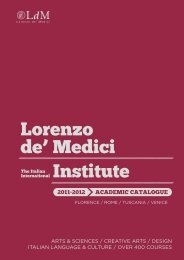aCademiC Catalog 2013-2014 - Lorenzo de Medici
aCademiC Catalog 2013-2014 - Lorenzo de Medici
aCademiC Catalog 2013-2014 - Lorenzo de Medici
You also want an ePaper? Increase the reach of your titles
YUMPU automatically turns print PDFs into web optimized ePapers that Google loves.
skills, physical expressiveness, clarity of speech and vocal<br />
projection, on their ability to emulate or generate emotional<br />
and physical conditions, and on their ability to analyze and<br />
un<strong>de</strong>rstand dramatic texts. This course offers stu<strong>de</strong>nts an<br />
opportunity to be involved in a theatre production, directly<br />
on stage and un<strong>de</strong>r the guidance of a professional theatre<br />
director and actor. They will perform minor roles in a play by<br />
a contemporary playwright chosen by the artistic direction<br />
committee of the “Quartieri <strong>de</strong>ll’Arte” Festival. The production<br />
will have its premiere in the Festival season.<br />
Contemporary Italy through the Cinema<br />
MCT 220 T<br />
Cr: 3; Contact hrs: 45<br />
This course investigates cultural and social topics in Italy’s<br />
recent past and present with the aid of the medium of film.<br />
Through images from some of the most important works of<br />
Italian cinema, from the masters of Neorealism to new directors<br />
such as Sorrentino and Garrone, stu<strong>de</strong>nts will investigate<br />
themes such as fascism, the Italian south, the family, the role<br />
of women, organized crime, and the consequences of the<br />
economic boom.<br />
Italian Theatre from Arena to Opera<br />
MCT 278 T; Dual listed: LIT 278 T<br />
Cr: 3; Contact hrs: 45<br />
This course is an introduction to the history of theatre and<br />
performing arts in Italy from antiquity to the 20th Century.<br />
Stu<strong>de</strong>nts will study Greek and Roman tragedies and comedies<br />
and the sports and the games so popular in antiquity. They<br />
will then explore the <strong>de</strong>velopment of medieval sacred<br />
representations; the Commedia <strong>de</strong>ll’Arte; the total performances<br />
of the Renaissance and Baroque periods and their ultimate<br />
culmination in Italian opera; works by Goldoni; Piran<strong>de</strong>llo and<br />
Italian Futurism. Translated texts of all authors studied will be<br />
required reading in class or as homework, and original versions<br />
of some of the above-mentioned texts will be read in class.<br />
Discussions will be based on the stu<strong>de</strong>nts’ readings.<br />
Italian Society through the Cinema<br />
MCT 282 T; Dual listed: SOC 275 T<br />
Cr: 3; Contact hrs: 45<br />
This course presents the <strong>de</strong>velopment and changes of the Italian<br />
society in the last <strong>de</strong>ca<strong>de</strong>s as seen through Italian cinematic<br />
vision. The films discussed during the lectures will be shown<br />
in chronological or<strong>de</strong>r, and cover some of the most significant<br />
periods of Italian society: Fascism, the war and post-war time,<br />
the economic boom of the early sixties, the anger and protest<br />
of the young generation. “Genre” movies will be discussed<br />
with special attention given to the “Comedy Italian Style”.<br />
Information about the most important periods of Italian history,<br />
from Fascism to the present time, will be followed throughout<br />
the course. Films are in Italian with English subtitles.<br />
Film Studies<br />
MCT 295 T<br />
Cr: 3; Contact hrs: 45<br />
This course is an introduction to the study of film as an art<br />
form. Rather than take the Hollywood mo<strong>de</strong>l as the “natural”<br />
form for a film, stu<strong>de</strong>nts will be encouraged to regard it as<br />
only one, albeit predominant, form of filmmaking among many<br />
others. Stu<strong>de</strong>nts will analyze the different elements and formal<br />
principles that make up a film and explore how these have<br />
evolved historically in a variety of movements. Stu<strong>de</strong>nts will<br />
view a number of landmark films and study how they combine<br />
different elements, such as sound, editing and mise-enscène,<br />
to construct different narratives. Although the primary<br />
emphasis will be on aesthetics, films will also be placed in<br />
their historical, political, technological, and economic contexts<br />
within Tuscania as a location. The basic goal of this class is to<br />
<strong>de</strong>velop an un<strong>de</strong>rstanding of the art and history of film, and to<br />
think critically about filmmaking.<br />
History of Italian Cinema<br />
MCT 298 T<br />
Cr: 3; Contact hrs: 45<br />
This is an intermediate level course <strong>de</strong>aling with the<br />
<strong>de</strong>velopment of Italian cinema from Neorealism to the present<br />
time. Renowned directors such as Rossellini, De Sica, Visconti,<br />
Fellini, Antonioni, Pasolini, and the most significant works of<br />
both neorealist and post-neorealist times (Rome Open City,<br />
The Bicycle Thief, Riso amaro, La strada, etc.), will be analyzed.<br />
The infuence of Fascism, post-war crisis, the economic miracle,<br />
and the protests of 1968 will be taken into consi<strong>de</strong>ration,<br />
along with the most common themes in Italian cinema such as<br />
social injustice, psychological and existential analysis, neurotic<br />
alienation, crisis and <strong>de</strong>ca<strong>de</strong>nce of the bourgeoisie and the<br />
overall ironic portrayal of Italian society. Genre, techniques,<br />
style, language and symbolism will be discussed.<br />
Theatre Management<br />
MCT 345 T<br />
Cr: 3; Contact hrs: 45<br />
The course consists of both a theoretical and a practical<br />
approach to marketing in the entertainment industry, and<br />
aims at giving theatre stu<strong>de</strong>nts a hands-on approach to the<br />
fundamental rules of communications and organization. The<br />
main goals are to gain experience in stage management,<br />
public relations, organization and publicity of events in the<br />
entertainment industry at an international level. Stu<strong>de</strong>nts<br />
will be required to actively participate in the organization,<br />
marketing and publicity of the QdA («Quartieri <strong>de</strong>ll’Arte»), an<br />
international new writing festival. They will have the opportunity<br />
to work un<strong>de</strong>r the guidance of experienced production staff<br />
members, such as the managing & communications directors,<br />
allowing stu<strong>de</strong>nts to be trained in the organization of theatrical<br />
events in general. Stu<strong>de</strong>nts will be specifically required to<br />
work alongsi<strong>de</strong> the press officer and publicity manager long<br />
before the opening event. The publicity manager must obtain<br />
all relevant information from the producers and directors and<br />
find a graphic <strong>de</strong>signer for posters and flyers, as well as handle<br />
public announcements and mailings. The press officer acts as<br />
the official media contact handling all media interest. Work<br />
as a press officer in the non-profit sector is likely to inclu<strong>de</strong><br />
a broa<strong>de</strong>r range of activities with employers ranging from<br />
charities to event organizers. In addition to handling media<br />
inquiries, writing press releases, arranging interviews and press<br />
conferences, duties may also inclu<strong>de</strong> <strong>de</strong>termining who has press<br />
passes. A press officer may also accompany individuals, such as<br />
authors, directors and/or artists, on interviews. Through a series<br />
of workshops and seminars with major European organizational<br />
entities, stu<strong>de</strong>nts will obtain a clearer picture of the hands-on<br />
organization and publicity within the entertainment industry.<br />
Set and Costume Design<br />
MCT 380 T<br />
Cr: 3; Contact hrs: 90<br />
This course consists of both practical and theoretical sections,<br />
and will be taught by the costume and set <strong>de</strong>signers of the<br />
chosen play production and their assistants. During the first<br />
half of the course the stu<strong>de</strong>nts will experiment with <strong>de</strong>signs<br />
for works of drama. In the second half they will take part in<br />
the realization of the play production <strong>de</strong>sign project: Theatre<br />
in Process II. The course will inclu<strong>de</strong> lectures in art history<br />
and aesthetics. The stu<strong>de</strong>nts will be able to watch theater<br />
productions <strong>de</strong>signed by some of the best set and costume<br />
artists in Italy and Europe.<br />
Playwriting<br />
MCT 400 T<br />
Cr: 3; Contact hrs: 90<br />
This course consists of both theoretical and practical parts<br />
and aims at encouraging playwriting. Both classical and<br />
contemporary plays will be read and analyzed in <strong>de</strong>tail from<br />
a playwriting point of view. Wrights method will be studied<br />
in <strong>de</strong>tail and compared with other playwriting textbooks.<br />
Through a series of etu<strong>de</strong>s, games and exercises on technique,<br />
plot, character, structure, collaboration and writer’s block, the<br />
stu<strong>de</strong>nts will be able to find what works for them, and <strong>de</strong>vise<br />
their own writing style. The guiding principle of the course is<br />
working and thinking theatrically. Stu<strong>de</strong>nts start by consi<strong>de</strong>ring<br />
the components of the theatrical and end by trying to access<br />
and use these components in their writing. The course studies<br />
the internal organization of international new writing theaters<br />
and centers and inclu<strong>de</strong>s interviews with playwrights who<br />
have taken part in “Intertext”, a new writing project created<br />
School of Arts & Sciences TUSCANIA<br />
LdM Aca<strong>de</strong>mic <strong>Catalog</strong> <strong>2013</strong>-<strong>2014</strong><br />
163





